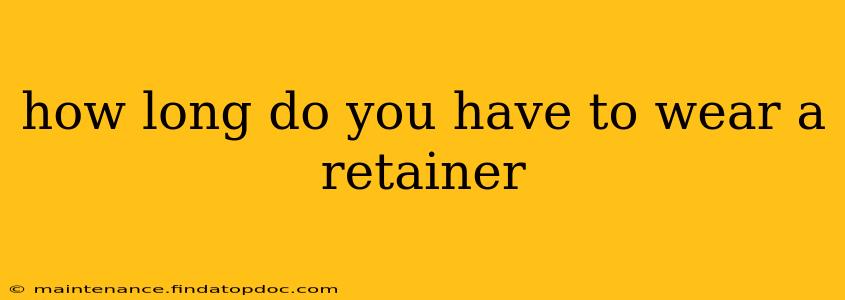After the exciting culmination of orthodontic treatment, the journey isn't quite over. Maintaining that perfectly aligned smile requires diligent retainer wear. But just how long do you need to keep that retainer in your mouth? The answer, unfortunately, isn't a simple number. It depends on several individual factors, and ignoring your orthodontist's recommendations can lead to teeth shifting back to their original positions.
What Determines Retainer Wear Time?
The duration of retainer wear is highly personalized. Your orthodontist will consider several key aspects of your case:
-
Severity of misalignment: More severe cases typically require longer retainer use to ensure stability. Minor adjustments may need less time.
-
Age: Younger patients tend to have more bone growth, making their teeth more prone to shifting. Adults generally have more stable bone structure.
-
Compliance: Consistent retainer wear is crucial. Inconsistent use significantly increases the risk of relapse.
-
Type of retainer: Different types of retainers offer varying levels of retention. We'll explore these below.
Types of Retainers and Their Wear Time
Orthodontists use various types of retainers, each with its own recommended wear schedule:
1. Removable Retainers (Essix, Hawley):
These are plastic or wire appliances that you can take out for eating, brushing, and flossing. Your orthodontist will likely recommend wearing these retainers full-time (22-24 hours a day) for the first few months to a year. After this initial phase, they might suggest transitioning to nighttime-only wear. However, some individuals may need to wear them indefinitely, especially those with a history of significant tooth movement.
2. Fixed (Bonded) Retainers:
These are thin wires cemented to the back of your teeth, usually on the lower arch. They are permanently bonded and require professional removal. They provide excellent retention and require little to no maintenance from the patient. The need for their long-term use is assessed by your orthodontist.
3. Lingual Retainers:
These are similar to bonded retainers but are placed on the inner surface of your teeth, making them less visible. The long-term wear schedule for lingual retainers mirrors that of bonded retainers.
How Long is "Long-Term"? The Reality of Retainer Use
While some individuals might transition to nighttime-only wear after a year, many will require longer periods of retainer usage, perhaps even indefinitely. This isn't a sign of failure; it's a reflection of maintaining the hard-won results of orthodontic treatment. Think of it as an investment in your long-term smile health.
What Happens if I Don't Wear My Retainer?
Relapse is a significant risk if you stop wearing your retainer too soon or inconsistently. Your teeth can gradually shift back to their original positions, negating all the effort and cost of your orthodontic treatment. Relapse can range from minor imperfections to a return to the original malocclusion, requiring further orthodontic intervention.
Can I stop wearing my retainer after a certain amount of time?
No, there's no set timeframe for discarding your retainer. The decision to stop or reduce retainer wear should always be made in consultation with your orthodontist. They'll monitor your progress and advise you when, and if, it's safe to reduce or discontinue use.
What should I do if my retainer breaks?
If your removable retainer breaks, contact your orthodontist immediately. Do not attempt to repair it yourself, as this could damage your teeth. For fixed retainers, contact your orthodontist for repair or replacement.
Your orthodontist is the best resource for personalized guidance on your retainer wear time. Regular check-ups are crucial to ensure your teeth remain stable and your smile stays perfect for years to come. Don't hesitate to ask questions and express any concerns you may have. The long-term health and appearance of your smile depend on it.
